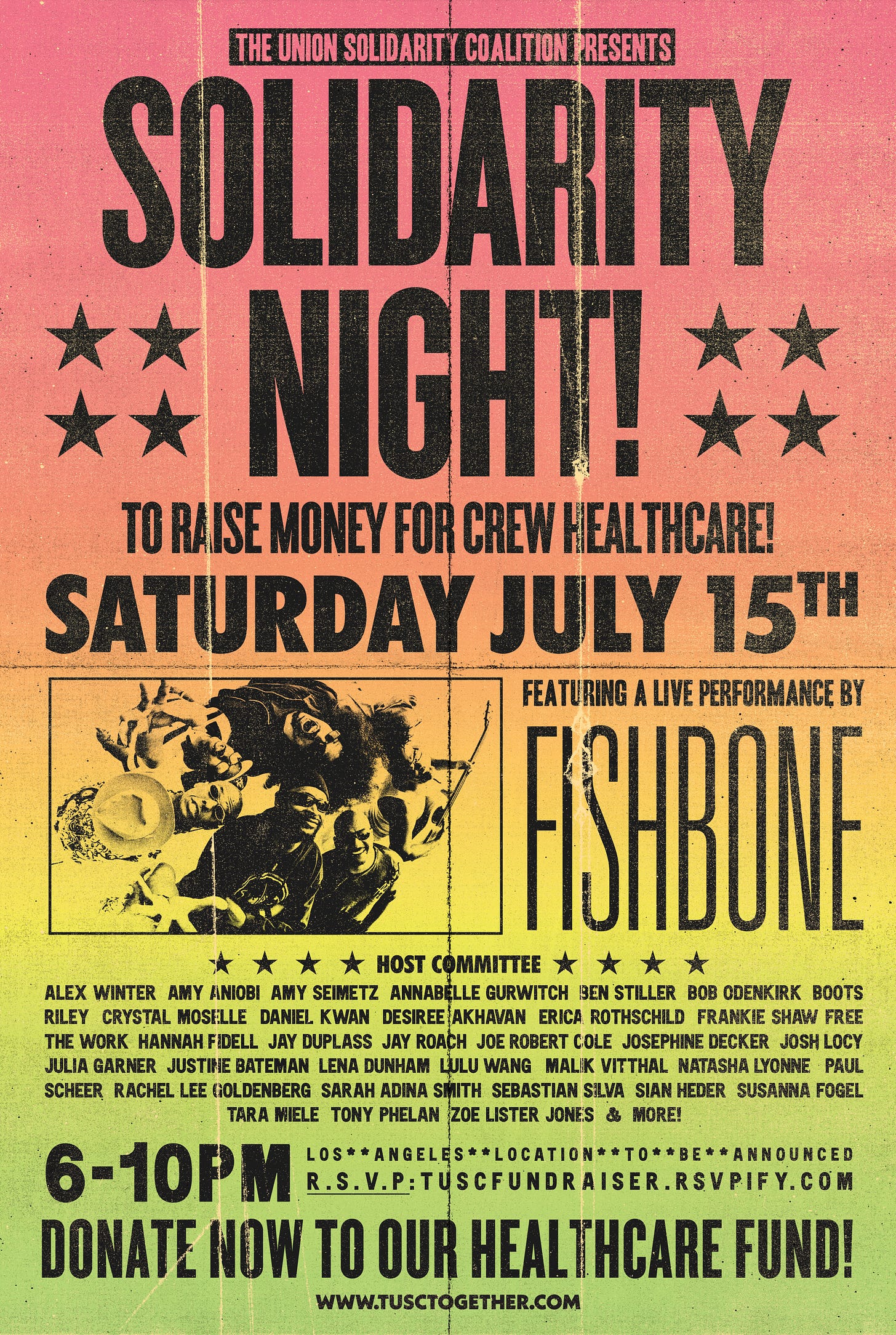Exclusive: Writer-Directors Launch Union Solidarity Coalition
Big names move to support below-the-line crew — including plans for a starry July show
(This is a repost of story, lightly edited, that first appeared on Strikegeist, our FREE newsletter covering Hollywood’s labor strife. Sign up here.)
As the writers strike grinds on, The Ankler can report that a high-profile group of writer-directors is teaming up with the Motion Picture Television Fund to raise funds to support IATSE members, Teamsters and other entertainment industry workers who are getting financially hit.
Girls creator Lena Dunham and The Spy Who Dumped Me writer-director Susanna Fogel both hopped on the phone Tuesday to tell me more about the fund — The Union Solidarity Coalition, or TUSC for short. The pair are two of the founders in a group that includes Crystal Moselle, Rachel Lee Goldenberg, Tara Miele, Alex Winter, Josh Locy, Paul Scheer, Amy Seimetz, Tony Phelan, Zoe Lister-Jones, Justine Bateman, Sarah Adina Smith and Frankie Shaw.
Their plan, they told me, began with a WhatsApp thread of writer-directors.
In this group, Fogel says, “[Our] writer identity was on strike; [our] director identity wasn't sure what to do and what not to do.”
Through the work stoppage, Fogel and Dunham peeled off into a sub-group of that initial WhatsApp thread, thinking over the idea of a fundraiser for those from other unions impacted by choosing not to cross picket lines on set (and thus have emboldened the writers’ cause).
That led to a Zoom meetup between the writer-director group and several gaffers, the multi-hyphenates checking in on their below-the-line counterparts and chatting about the strike from their different perspectives.
“It was such a nice sense of community that everybody felt. And on that Zoom, those gaffers admitted that they often don't meet writers. Some of them are like, ‘You know, we've never met this many writers before.’ And, yet, it was our strike that was majorly impacting the whole business and their lives very, very directly,” says Fogel. “That inspired us to talk about ways that we could come together with the crew, because for those of us on set, that's our family, and moments like this can get really divided and factionalized.”
As the strike stretches through Day 59, the financial reality of the work stoppage is hitting industrywide — not just for the writers, but for support staffers, crews, production companies and management agencies across town. (According to IATSE Local 728’s wage scale, hourly pay for an entry-level gaffer is $42.04.)
“We see the sacrifice that they're making to honor our picket lines,” says Dunham, who spoke to me from London, where it was past midnight. “It really started as a desire just to write a letter and express our gratitude and our solidarity, and the fact that we understood how this was impacting them. But then, it seemed like the only way to really back something like that up was to try to support them where it was hurting right now, and one of the pieces of feedback we heard was how much fear people had around health care.”

The Motion Picture Television Fund will administer the resources raised by TUSC — “We understand that we're writer-directors, not insurance experts,” says Dunham — and cover health insurance premiums for anyone who needs the assistance. The group’s fundraising goals are “significant,” says Fogel.
MPTF CEO and president Bob Beitcher tells me the organization’s help hotline currently fields between 50 to 100 calls a day, up from 15 a day before the strike began. Most of the calls come from those who are at risk and are struggling with mental health issues or other problems, he says.
“People came out of a pandemic draining their bank accounts,” says Beitcher. “They had a couple good years [afterward]… so maybe they caught up, maybe they thought it’d stay that way forever, then the door slams on them again.”
The first fundraising event in the series — featuring a performance by Fishbone — will take place on Saturday, July 15 at a TBD spot in L.A., hosted by a committee that includes Natasha Lyonne, Ben Stiller, Lulu Wang, Sian Heder and dozens of other writers, directors and actors. (You can RSVP at TUSCfundraiser.rsvpify.com.) Admission is free for crew members and $30 for everyone else.
TUSC is also launching an ongoing online auction that will allow attendees to bid on items such as signed scripts, script consultations with The Black List and Zoom coffees with filmmakers (where creative brains can be picked), etc.
“It's a solidarity coalition that we hope can also extend to PAs, runners, people that aren't protected by a union and are definitely struggling to figure out how to [get] things like coverage or health care premiums, but also who want to connect,” says Fogel. “We want to form connections across these lines.”




As an IATSE Gaffer for more than 20 years working Television and Features I have never made $18 an hour, our current basic agreement rate is $50 per hour.